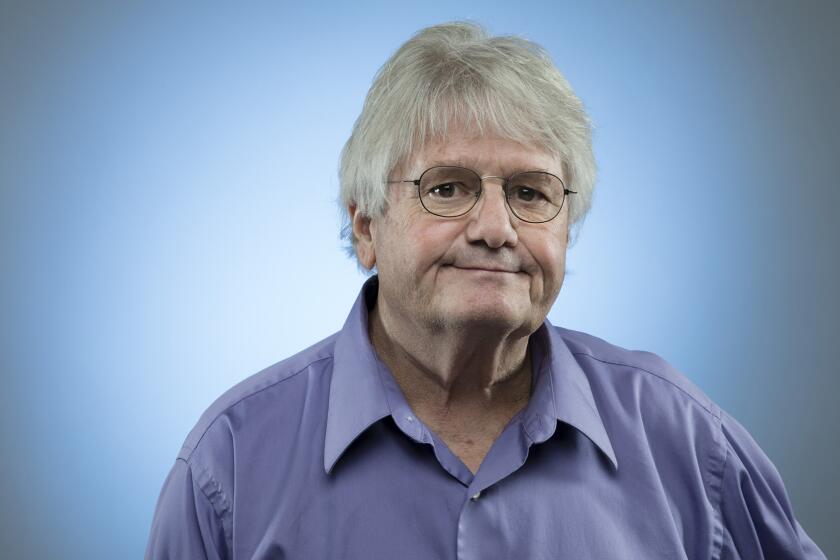Newsletter: Costco shooting: Are disabled people safe from police?
Good morning. I’m Paul Thornton, and it is Saturday, June 22, 2019. Let’s take a look back at the week in Opinion.
The United States stands on the brink of war with Iran, the front-runner for the Democratic presidential nomination waxed nostalgic about the way things were when segregationists were senators, and Los Angeles faces a worsening housing and homelessness crisis. And yet, a single episode of gun violence in Southern California — a sadly common occurrence that tends to be ignored — has captured the attention of our readers, judging by the number of letters to the editor we’ve received and our most-read articles online.
Given the details of this shooting, it’s not hard to understand why. So much about the tragedy involving an armed off-duty police officer and an intellectually disabled man who was with his parents touches on profoundly important public discussions. The issue of police use of deadly force comes to the fore, scrutinized all the more in this case because the officer was armed while off-duty and carrying his toddler son. But what also has been put into focus is our treatment of mentally disabled individuals, the subject of an op-ed article by novelist Marie Myung-Ok Lee, who says she worries constantly about the safety of her 19-year-old son:
My 19-year-old son has the face of an angel, but he lacks the cognitive ability, if lost, to ask for directions home. I worry about him continually: How will he navigate the world? Where will he live? Will he have a happy, meaningful life?
I also worry, now more than ever, about his interactions with police who don’t understand his disabilities.
[Last] week, a couple shopping at Costco with their adult nonverbal son with intellectual disabilities was shot and their son was killed by an off-duty Los Angeles police officer. A lot about what happened is unclear, and the store’s surveillance video has not yet been released, but the story the family’s attorney gives is an achingly familiar one to my husband and me: “His father was trying to intervene and explain that his son had a mental disability.… He was not attacking him at the time the officer shot.” A lawyer for the shooter described the off-duty officer as “fighting for his life.” The party we will never hear from, of course, is the man who was shot.
Unlike the man in Costco, who was described by relatives as “a gentle giant,” my son can react to stressors with self-injurious behavior or by attacking others. A bystander once called the police when our son had a meltdown in a Rhode Island supermarket and started biting me. The officer who responded fortunately had a nephew with autism. He saw that our son had calmed down and went on his way. A few months ago, our son became aggressive toward his aide on the New York subway. The police showed up, but again we were lucky. They allowed him to calm down and go on his way without being funneled into the criminal justice system. I am grateful but worried about the next time....
My son does not understand the law. But more urgently, the law does not understand people like him.
“Would the Costco shooter be in jail if he weren’t a cop?” isn’t the only question the L.A. Times Editorial Board has after the tragedy in Corona. Among the many others are: What if no one had a gun? Would the altercation have ended in just a handshake? Do police need better training on interacting with mentally disabled people? And why do they carry firearms when they are not working? L.A. Times
A former cop’s perspective: Retired LAPD Capt. David H. Dolson believes the focus on a suspect being unarmed misses the point. He writes: “We do not know the whole story. Have any of you actually tried to reason with someone exhibiting great mental distress? I have — sometimes it works, and sometimes it doesn’t. When it doesn’t, it is not pretty.” L.A. Times
What’s at stake in the census battle? Visit California’s Central Valley to find out. There, in predominantly Latino areas with hard-to-count households even in years when the Trump administration isn’t trying to undermine the decennial census by including a citizenship question, an important fact becomes clear: If the federal government truly wants to count every person living in the United States, the Census Bureau should employ more highly engaging Latino workers. New York Times
Another installment in our occasional series, “Housing crisis? What housing crisis?” Recently, state legislators couldn’t bring themselves to approve additional protections for renters who are increasingly unable to afford their homes — because it’s not like there’s any evidence they need some help, right? Now, the Southern California Assn. of Governments has voted to accept an estimate of 430,000 new dwellings in the region needed to abate the housing crisis, far below the roughly 1 million units experts say is needed. L.A. Times
Ethnic cleansing in California — yes, it happened. We’ve all heard the stories of rapacious gold miners flocking west prior to California establishing statehood in 1850. Less known is the darker, more important fact that thousands of indigenous people were slaughtered and countless more were removed to make way for the white new arrivals — and with the approval and help of state officials. This week, native Californians finally got a formal and overdue apology from the governor. L.A. Times
Reach me: paul.thornton@latimes.com
A cure for the common opinion
Get thought-provoking perspectives with our weekly newsletter.
You may occasionally receive promotional content from the Los Angeles Times.




